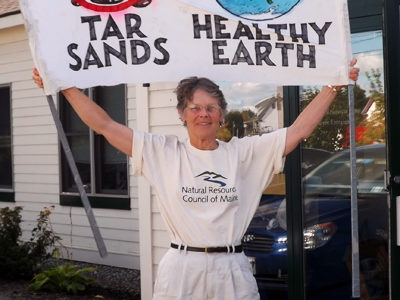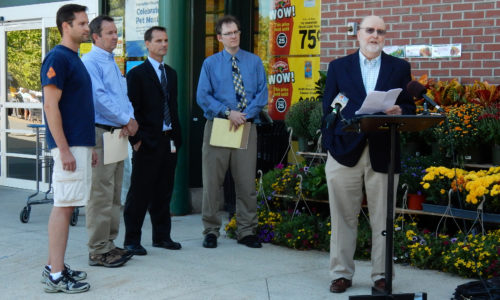NRCM news release For more information, see: www.nrcm.org/wp-content/uploads/2013/11/JacksonLab9.pdf While businesses across Maine are scrambling to deal with the electric price increases that are slated to hit customers this winter, Jackson Lab has already taken steps to help ease its exposure, through wise energy-efficient investments over the last few years. “With help from Efficiency Maine and Read More
Climate Change
Climate change and global warming pollution harm Maine people, wildlife, and our environment. Global warming, also known as climate change, is caused by a blanket of pollution that traps heat around the earth. This pollution comes from cars, factories, homes, and power plants that burn fossil fuels such as oil, coal, natural gas, and gasoline.
Climate-changing pollution knows no boundaries. It enters the atmosphere, spreads across the globe, and traps heat around the earth for 50-200 years after it is emitted. That is why we need to reduce global warming pollution now, because our children, and their children, will still feel the effects of global warming for years to come. Currently, the levels of carbon dioxide in the atmosphere are at their highest levels in hundreds of thousands of years.
Learn how you can reduce climate-changing pollution and advocate for a cleaner, healthier Maine.
Historic Eight Million Comments Delivered in Support of EPA Clean Power Plan, Including Thousands from Maine
Milestone Reached as the Public Comment Period Closed at Midnight, Highlighting 2+-Year Effort to Give a Voice to Maine Citizens Who Want Clean Energy and Action on Climate Change News Release Augusta, ME—As the public comment period on the Clean Power Plan came to a close at midnight on Monday, Maine groups supporting climate action Read More
Angus King to Cast Pivotal ‘No’ Vote on Keystone Pipeline
The Maine senator confirms that he will vote against the project that a Louisiana Democrat considers crucial to saving her career. By Kevin Miller, Staff Writer Portland Press Herald news story Maine Sen. Angus King said he plans to cast a pivotal vote against a Keystone XL pipeline bill on Tuesday, potentially scuttling supporters’ efforts Read More
A Completely Green-powered Island Gives Mainers Ideas
The Danish island of Samsø becomes a classroom and source of inspiration for a group of Maine students and residents. By Mary Pols, Staff Writer Portland Press Herald news story There are 4,613 islands in the state of Maine, 15 of them inhabited year-round by people who understand that on a Maine island, the wind Read More
TransCanada Seeks Permit to Build North America’s Longest Tar Sands Oil Pipeline
Maine groups react in strong opposition News Release Portland/Augusta Maine – Today international energy giant TransCanada applied for permits to build its Energy East pipeline to carry tar sands oil from Alberta to Quebec and New Brunswick. Leading conservation groups in Maine denounced the plan. If approved, the pipeline would be the largest in North Read More
A River of People
They were old and young. Men and women. Black, white, brown, and everything in between. Workers with hardhats and professors. It seemed like the full spectrum of American diversity was on the streets in New York on Sunday, September 21st. And they were all calling for action on climate change. The messages were as diverse Read More
Maine Business Leaders, Citizens Press Senator Collins to Support EPA Action on Climate Change
400 Businesses Have Signed On Urging Collins to Act NRCM News Release PORTLAND, MAINE – Today, leading environmental organizations, lobstermen, wind and ocean energy experts, and other Mainers gathered near Senator Collins’ Portland office encouraging her to support the EPA’s Clean Power Plan when she goes back to Washington, D.C. next week. They unveiled a list Read More
Gulf of Maine is Warming Faster than 99% of World’s Oceans, Say Scientists
The water level is rising and species such as cod and herring are moving to colder waters. By Patrick Whittle, The Associated Press Watch full news video FRIENDSHIP — Imagine Cape Cod without cod. Maine without lobster. The region’s famous rocky beaches invisible, obscured by constant high waters. It’s already starting to happen. The culprit Read More
Regional Greenhouse Gas Initiative (RGGI) Marks Milestone 25th Carbon Auction
New Reports Demonstrate Success of RGGI for Maine People, Business, Economy NRCM news release Westbrook, ME – Businesses and energy leaders gathered with the Natural Resources Council of Maine (NRCM) today to celebrate the success of the Regional Greenhouse Gas Initiative or RGGI. The multistate program to limit climate-changing carbon pollution from power plants achieved Read More












